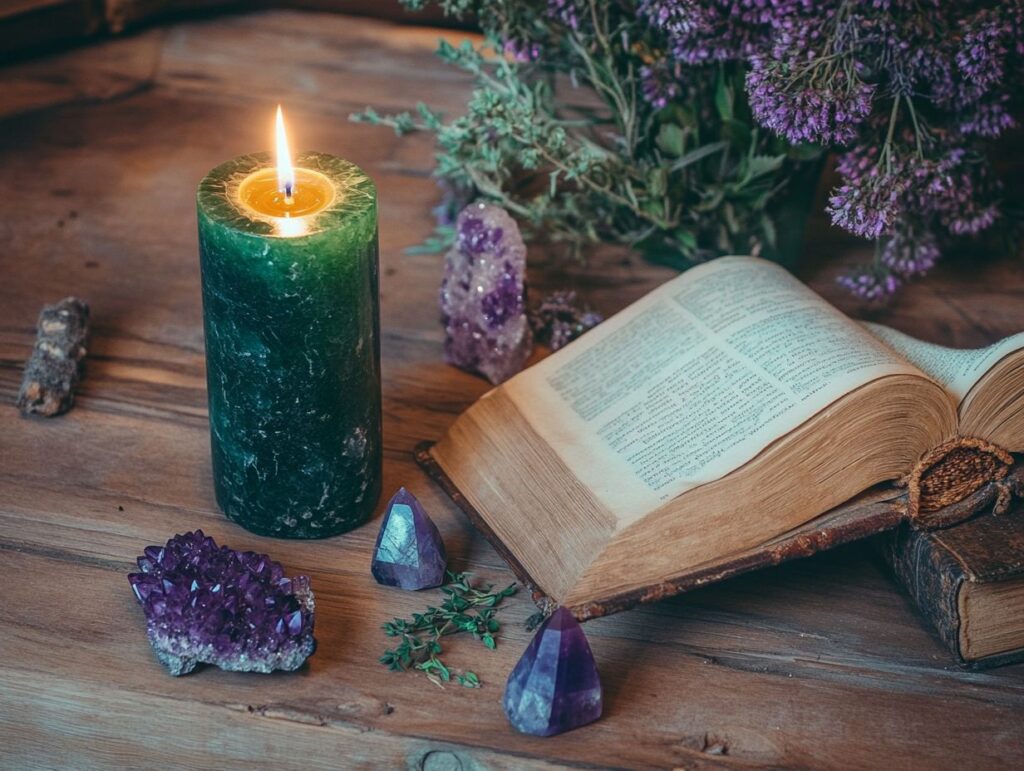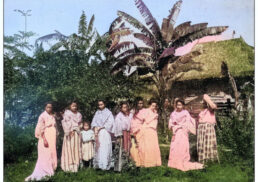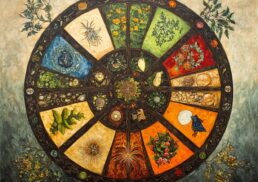Pagan and esoteric traditions represent a rich tapestry of beliefs and practices that have developed over centuries, often grounded in nature and ancient wisdom. This guide aims to enhance understanding of these spiritual paths by providing essential definitions and a historical overview.
It examines core beliefs, dispels common misconceptions, and underscores the personal and communal benefits of engaging with these traditions. Whether one is a curious beginner or seeking deeper connections, this exploration into the mystical offers valuable insights and opportunities for enrichment.
Table of Contents
Key Takeaways:
- Pagan and esoteric traditions are ancient spiritual paths that involve connecting with nature and exploring personal growth.
- These traditions have a rich history, with origins dating back thousands of years and evolving over time.
- Exploring these traditions can debunk common misconceptions and provide a sense of community and intergenerational connections.
Understanding Pagan and Esoteric Traditions

Understanding Pagan and Esoteric Traditions necessitates an in-depth examination of the complex tapestry of beliefs and practices that have developed over centuries. This exploration encompasses a diverse range of philosophies, including modern Paganism and Wicca.
These spiritual paths are rooted in ancient traditions and serve to connect individuals to nature, the universe, and a more profound sense of self through various rituals and ceremonies.
The study of these traditions, from the Wheel of the Year to personal spirituality, provides a meaningful journey into the human experience. It underscores the significance of community and shared beliefs in fostering spiritual growth.
Defining the Terms
Defining the terms related to Paganism and Wicca is essential for comprehending the complexities of these spiritual paths, as each term embodies distinct concepts and practices inherent to these traditions.
“`html
Paganism is broadly defined as a collection of spiritual beliefs that often emphasize nature, polytheism, and earth-based rituals. Within this broader framework, Wicca emerges as a modern, organized religion that integrates elements of Paganism while focusing on the veneration of the Goddess and God, personal empowerment, and the application of magical practices. For those interested in exploring these themes further, you can read more in What Are Pagan and Esoteric Traditions? A Beginner’s Guide to Ancient Spiritual Paths.
Modern Paganism includes a diverse array of “neopagan” movements that reinterpret ancient traditions, frequently incorporating contemporary ethics and environmentalism. For example, practices may feature seasonal festivals such as Samhain or Beltane, which serve to connect practitioners with the natural cycles of the earth, thereby reflecting a profound understanding of one’s position within the universe.
Each of these terms illuminates the rich tapestry of beliefs that attract individuals seeking alternative spiritual paths.
The History of Pagan and Esoteric Traditions
The history of Pagan and Esoteric Traditions constitutes a rich narrative that extends over thousands of years, illustrating humanity’s evolving relationship with nature, spirituality, and the cosmos.
This history encompasses a variety of ancient traditions, many of which have significantly influenced the modern Paganism observed today, including practices such as Wicca and the utilization of magical tools like the Book of Shadows.
A thorough understanding of this historical context is crucial for appreciating how these spiritual paths have developed, adapted, and thrived in response to cultural shifts and societal changes.
Origins and Evolution of These Spiritual Paths

The origins and evolution of Paganism and Wicca present a sophisticated amalgamation of ancient traditions and modern spiritual practices that have undergone significant transformation over time.
Grounded in pre-Christian belief systems, these traditions draw upon a variety of ancient cultures, including Celtic, Norse, and Greco-Roman influences. As ancestral practices and rituals were transmitted through generations, they evolved into contemporary spiritual paths that emphasize reverence for nature, femininity, and the cyclical patterns of the earth.
Key milestones in this evolution include a resurgence of interest during the Renaissance, the emergence of the occult in the 19th century, and ultimately the establishment of Wicca in the mid-20th century. Present-day practitioners often integrate these historical elements into personal ceremonies, crafting a tapestry that reflects both their cultural heritage and modern values.
Beliefs and Practices in Pagan and Esoteric Traditions
Beliefs and practices within Pagan and Esoteric Traditions are characterized by a significant diversity, grounded in fundamental principles that emphasize the importance of nature, spirituality, and ethical responsibility.
Traditions such as Wicca highlight the value of rituals and ceremonies, which function as mechanisms for establishing a connection with the divine and the natural world.
Through activities such as spellwork, divination, and the utilization of magical tools like the Book of Shadows, practitioners engage in spiritual practices that foster personal development and community cohesion, while honoring the sanctity of life and the cycles inherent in nature.
Core Beliefs and Rituals
Core beliefs in Paganism and Wicca typically center around a reverence for nature, the cyclical patterns represented by the Wheel of the Year, and the engagement in rituals and ceremonies that promote spiritual connection and a sense of community.
At the core of these practices is a profound respect for the Earth and all its elements, which practitioners consider sacred. This respect manifests in vibrant celebrations corresponding with the changing seasons, such as Beltane and Samhain.
During these occasions, rituals often involve the lighting of candles, the creation of altars, and the invocation of elemental forces.
These ceremonies are designed to honor deities and nature spirits, thereby facilitating a connection between the community and the divine. The emphasis placed on personal intuition and experience give the power tos individuals to engage with their spirituality in ways that resonate uniquely with them, resulting in a rich tapestry of beliefs and practices that celebrate the interconnectedness of life.
Common Misconceptions about Pagan and Esoteric Traditions

Common misconceptions regarding Pagan and Esoteric Traditions arise from misunderstandings and stereotypes that frequently misrepresent the beliefs and practices of individuals who follow these spiritual paths, especially concerning Wicca and modern Paganism.
Debunking Myths and Stereotypes
Debunking the myths and stereotypes surrounding Paganism and Wicca is crucial for promoting a more accurate understanding of these rich spiritual traditions and their practitioners.
Many individuals mistakenly associate these practices with negative connotations, often viewing them through a lens of misunderstanding or superstition. In reality, individuals who identify with these paths typically advocate for harmony with nature and exhibit a profound respect for the natural cycles of the earth. Contrary to popular belief, they do not partake in malevolent rituals; instead, they celebrate the interconnectedness of life through various customs and observances.
By shedding light on the true nature of these beliefs, one can gain a deeper appreciation for the diversity within spiritual paths, ultimately fostering respect for those who find meaning and purpose in their traditions.
Benefits of Exploring Pagan and Esoteric Traditions
Exploring Pagan and Esoteric Traditions presents a variety of benefits, including significant personal growth and an enhanced connection to nature.
Through spiritual practices such as rituals and ceremonies, individuals can develop a sense of purpose and foster a sense of belonging within a community that upholds shared beliefs.
This exploration not only enriches one’s personal spirituality but also promotes opportunities for ethical responsibility and a deeper understanding of universal concepts that resonate across diverse spiritual pathways.
Personal Growth and Connection to Nature

The journey of personal growth within Paganism frequently entails a significant connection to nature, promoting a sense of harmony and balance through various spiritual practices and rituals.
This connection is nurtured through activities such as mindful walking in natural environments, ritualistic celebrations of the changing seasons, and the incorporation of natural elements in ceremonial practices.
By engaging with the Earth and its cycles, practitioners often attain a deeper understanding of themselves and their place within the universe. Meditation conducted under the expansive sky or alongside a flowing river can further enhance spiritual awareness, offering a reflective space for personal insights.
The use of altars adorned with flowers, stones, and herbs fosters a tangible connection to the Earth’s vitality, emphasizing the importance of rituals in cultivating a sense of belonging and facilitating ongoing personal evolution.
Community and Intergenerational Connections
Community and intergenerational connections hold significant importance in Paganism, as shared practices and traditions are transmitted through generations, fostering a sense of belonging and collective identity.
The significance of belonging to a community within these traditions cannot be underestimated; it establishes a supportive environment in which individuals can explore their spiritual paths alongside one another.
Through rituals, celebrations, and shared experiences, practitioners not only deepen their understanding of specific beliefs but also cultivate enduring bonds that enhance the social fabric of the community.
The wisdom imparted from elders to younger followers nurtures a rich tapestry of knowledge, promoting mentorship and fostering resilience within the community.
This intricate network of relationships not only uplifts individual spirituality but also upholds the communal values that define Pagan practices.
How to Get Started on Your Journey
Embarking on a journey into Paganism can be both an exhilarating and daunting experience, as there is a wealth of resources and communities available to assist beginners in exploring these spiritual paths.
Resources and Support for Beginners
Resources and support for individuals beginning their journey in Paganism are readily available, providing valuable guidance and insights into the spiritual path ahead.
With a wide array of options at their disposal, those embarking on this journey can explore various publications that introduce the core beliefs and practices of Paganism, such as:
- “The Spiral Dance” by Starhawk
- “Wicca: A Guide for the Solitary Practitioner” by Scott Cunningham
Additionally, websites such as Patheos and The Wild Hunt serve as dynamic platforms where newcomers can connect with experienced practitioners and access a wealth of informative articles.
Engaging with community groups on social media platforms or participating in local gatherings can foster a sense of belonging and provide essential support, thereby enriching one’s spiritual learning experience.









